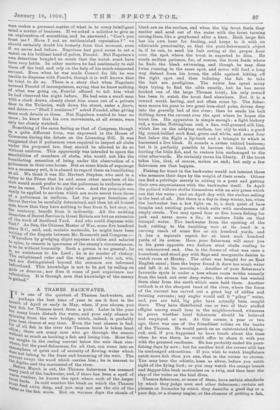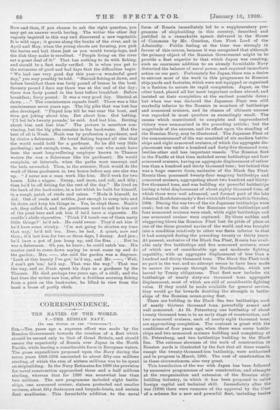A THAMES BACKWATER.
IT is one of the quietest of Thames backwaters, and Perhaps the best time of year to see it first is the )21eaMi of April or early in May, when, if you choose, you 41,2V fish for Thames trout from a punt. Later in the year e, many boats disturb the water, and your only chance is einluiing from the weir bridge; which, indeed, is probably 3;4'4 best chance at any time. Even the best chance is bad, or of all fish in the river the Thames trout is taken least yet"; there are many men who go through the season a Ith°14 so much as hooking a fish and losing him. More fish Caught in the racing current below the weir than else- Ittgere, but the punt.fishermay, for all that, can come into an InosPher d e of quiet an of serenity of flowing water which eh9e8 not belong to the foam and humming of the weir. The tfli."„ent sways the wood which carries him; he is nearest to 1.3aePthe and the movement of the river. ey ef°re March is out, the Thames fisherman has scanned erY Yard of the.backwater, and, if there has been a spell of ts,1111 weather, he knows the spot where each of the larger O;ut feeds. In cold weather the bleak on which the Thames stet1t feed swim deep, and you may not see the stir of the
"." as the fish move. But on warmer days the shoals, of
bleak are on the surfing), and when the big trout feeds they scatter and scud out of the water with the trout turning among them like a greyhound after a hare. Each large fish has his own hour for feeding, and keeps to it with an
admirable punctuality, so that the punt-fisherman's object is,. if he can, to send his bait roving at the proper hour over the spot where the trout is expected to dine. He needs endless patience, for, of course, the trout feeds where he. finds the bleak swimming, and though he may dine
twice running in the same spot, and never will feed a long way distant from his home, the odds against hitting off the right spot and then inducing the fish to take the bait are prodigious. The writer has spent many days trying to find the odds exactly, but he has never hooked one of the large Thames trout; his only reward
has been to watch the trout feed elsewhere. But it is a
reward worth having, and not often come by. The fisher- man moors his punt to two great iron-shod poles, driven deep into the gravelly bed of the river; then he sends his bait drifting down the current over the spot where he hopes the trout lies. His apparatus is simple enough: a light hickory rod, a wooden Nottingham reel, a fine, well-greased silk line, which lies on the eddying surface, too oily to sink; a good big round-bellied cork float, green and white, and some four feet below the flight a lip-hook and a triangle to which is harnessed a live bleak. It sounds a rather unkind business,; but it is perfectly possible to harness the bleak without hurting the little fish, and to restore him undamaged to the river afterwards. He certainly earns his liberty. If the trout takes him, that, of course, makes an end; but only a few fishermen see that happen. Fishing for trout in the baokwater would not interest those who measure their days by the weight of their creels. Others can find a privilege merely in sitting in a punt and getting their own acquaintance with the backwater itself. In April the pollard willows clothe themselves with an airy green which can tint the water ; and an April day with the cuckoo calling is the best of all. But there is a day in deep winter, too, when the backwater has a low light on it, a dark quiet of bare boughs and swirling pools which suits with carelessness of empty creels. You may spend four or five hours fishing for jack and never move a fin; it matters little on that tranquil water. The backwater from the opening of the lock cutting to the tumbling weir at its head is a curving reach of some five or six hundred yards, and it has a separate aspect for at least each hundred yards of its course. Here your fisherman will moor you in his punt opposite two . forlorn steel shells rusting to an unhououred end. One is the frame of what was once a houseboat, and stood gay with flags and marguerite daisies to watch races at Henley. The other was bought for an East English canal; then the buyer found it drew too much water and left it at its moorings. Another of your fisherman's favourite spots is under a tree whose roots writhe uneasily from the bank out over deep water; the stream has washed them clear from the earth which once held them. Another outlook is at the sharpest bend of the river, where the force of the current has carved out a great bay of eddies and twisting currents; any angler would call it " pikey " water, and, you are told, big pike have actually been caught there. They have distributed one or two of their stuffed effigies among small inns in the neighbourhood, witnesses to prove whether local fishermen should be believed and employed or. not. At this corner, a year or two ago, there was one of the friendliest robins on the banks of the Thames. He would perch on an outstretched fishing. rod, and, if you happened to have lunch about the time when he was there, he would offer to share it with you with the greatest readiness. He has probably ended his punt- fishing days by now; but for another bird the corner still has its unchanged attractions. If you wish to watch kingfishers catch more fish than you can, that is the corner to choose. You may hear the whistle, keen as silver, before you catch sighted the flying bird; or you may watch the orange breast and dagger-like beak motionless on a twig, and then hear the slap of the water as the bird dives. Thames fishermen, or some of them, have certain standards by which they judge men and other fishermen; certain set phrases or formulas by which they describe a good day or a poor day, or a clumsy angler, or the °llamas of getting a fish. Now and then, if you chance to ask the right question, you mey get an answer worth having. The writer the other day vaguely inquired in this way and discovered a new vegetable. It is wild rape ; it grows along the banks of the river, and in April and May, when the young shoots are forming, you pick the leaves and boil them just as you would turnip-tops, and the dish they make is excellent. "People living on the river eat a great deal of it." That has nothing to do with fishing, and should be a fact easily verified. It is when you get to the estimates of good and bad days that the difficulties begin. "We had one very good day this year—a wonderful good day," you may possibly be told. "Started fishing at dawn, and before breakfast there was forty pound of bream in the boat. Seventy pound I dare say there was at the end of the day; there was forty pound in the boat before breakfast. Before breakfast; forty pound. It was a very good day. Started at dawn...." The reminiscence repeats itself. There was a like reminiscence seven years ago. The big pike that was lost has also developed. "Played him till be was near the boat, and then got joking about him. Bet about him. Got betting.
bet he's twenty pounds,' he said. And lost him. Betting about him and lost him." The picture is somehow con- vincing, but the big pike remains in the backwater. But the best of all is Noah. Noah was by profession a gardener, and by choice a fisherman. He loved fishing beyond all else that the world could hold for a gardener. So he did very little gardening ; not enough, even, to satisfy one who must have been the most long-suffering employer known to Thames . waters (he was a fisherman like his gardener). He would complain, at intervals, when the paths were unswept and the beds unweedcd. Then, in the summer, Noah would do the work of three gardeners in two hours before any one else was up. " I never see a man work like him. He'd work for two hours. Like a nigger. Sweep, and mow, and roll, and tidy; then he'd be off fishing for the rest of the day." He lived on the bank of the backwater, in a hut which be built for himself, in a rough patch of reeds and osiers. "Made it himself, be did. Out of reeds and nettles, just enough to creep into and lie down and keep his things in. Yes, he slept there. Noah's ark, they called it, and the gentlemen used to call to him out of the punt here and ask him if he'd have a cigarette. He couldn't abide cigarettes. 'Think l'd touch one of them misty little things ?' he'd ask. He could swear. They'd ask him if he'd have some whisky. 'I'm not going to shorten my time that way,' he'd tell 'em. Beer, he had. A quart, now and then; it'd last him for two or three days, I dessay. And jam ; he'd have a pot of jam hung up, and the flies. . . . But be was a fisherman. Oh yes, he know; he could catch 'em. His master used to come down saying he must come up and do the garden; Mrs. —, she said the garden was a disgrace.
'Look at this beauty I've got,' he'd say, and Mr: 'Well, I can't get 'em,' he'd say. That was the way." That was the way, and so Noah spent his days as a gardener by the Thames. He died perhaps two years ago, of a chill; and the last time the writer saw him, after a fruitless morning fishing from a punt on the backwater, he lifted to view from the bank a brace of portly chub.





































 Previous page
Previous page